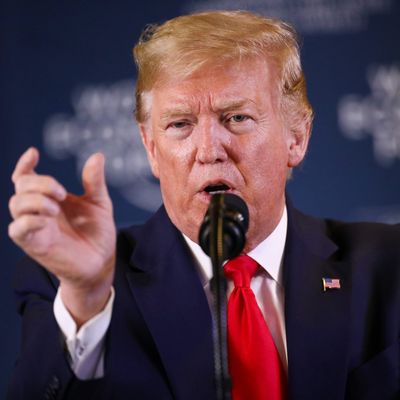
Though Trump’s trade war with China proves he doesn’t have a firm grip on macroeconomic strategy, a comment the president made at Davos reveals he doesn’t have a strong understanding of the field’s terms either. Complaining about the World Trade Organization’s policy of favoring developing nations over fully industrialized economies, Trump berated the “very unfair” practice:
I’ve had a dispute running with them for quite a while, because our country hasn’t been treated fairly. China is viewed as a developing nation. India is viewed as a developing nation. We’re not viewed as a developing nation. As far as I’m concerned, we’re a developing nation too. But they got tremendous advantages by the fact that they were considered “developing” and we weren’t. And they shouldn’t be. But if they are, we are. And we’re talking about a whole new structure for the deal, or we’ll have to do something.
By any definition, the United States is not a developing country. Though the WTO does not specifically offer parameters for the classification, a good working definition includes nations which are not fully industrialized that have a low GDP per capita and a low Human Development Index — a composite ranking that includes factors like per-capita income, life expectancy, and education. (To pick one qualifier, the International Monetary Fund reports that the United States has the seventh-highest GDP per capita; the top six countries all have populations of less than 10 million.)
And to provide context for Trump’s frustration with not getting preferred treatment, the special provisions are not great levelers, but rather help seat developing countries at the table. According to Bloomberg, special provisions in WTO agreements “give developing countries more time to implement tariff reductions, increased asymmetrical access to foreign markets, protections that safeguard their trading interests, and technical support to help them implement WTO rules. The aim of these preferences is to help poorer countries to reduce poverty, generate employment, and integrate themselves into the global trading system.” The complaint over WTO treatment isn’t a new one for Trump: In August 2018, Trump threatened to leave the organization if “they don’t shape up,” while last year the White House proposed a new tier structure to prevent nations with powerhouse economies but middle-of-the-road GDP per capita — read: China — from claiming developing-country benefits.
In all likelihood, the president’s description of the United States as a developing nation was a disingenuous call for fair treatment, not a critique of the gross inequality built into the world’s largest economy, which — despite a $20 trillion-plus nominal GDP — cannot ensure food security for 18 million children, indoor plumbing for 2 million Americans, or a living wage for tens of millions of workers.






























